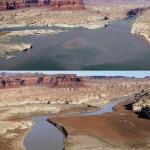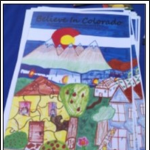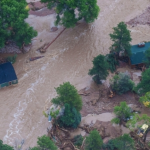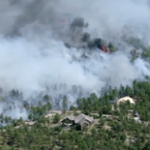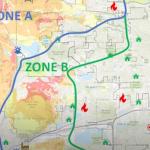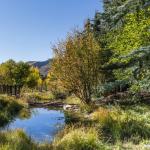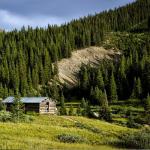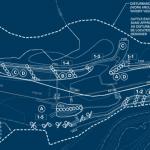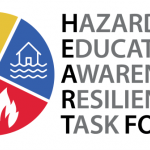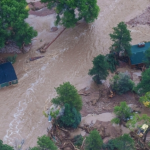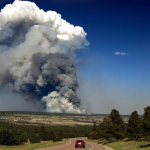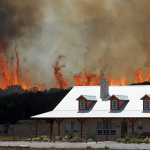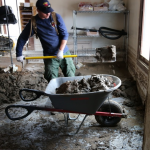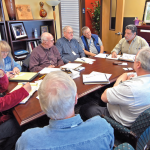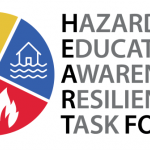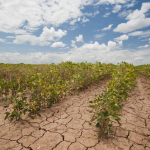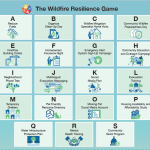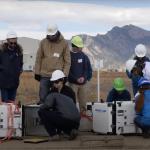Lesson Plans & Activities
Colorado Drought (Middle School)
This lesson is best taught at the beginning of a HEART Force unit, but it can also act as a stand-alone lesson to introduce students to drought in Colorado.
Students build an understanding of drought in Colorado using multiple data sources in a jigsaw activity.Lesson
Colorado-Based
Middle School

HEART Force Flood Response Game
This lesson is best used after the Colorado Flood lessons in the HEART Force curricular unit, for students to apply their learning and respond to a hypothetical flood in their own community.
This interactive game has students work in three “zone response teams” to solve community challenges that arise during the course of an extreme flooding event by using available individual and community resources.Game
Colorado-Based
Middle School
High School

The Vocabulary of Hazards
We suggest teaching this lesson to introduce the unit as it will benefit students in their understanding of natural hazards throughout the entire HEART Force Unit.
This lesson uses a matching game to build students' understanding and familiarity with different terms used in the world of resiliency planning.
Lesson
Colorado-Based
Middle School
High School

Envisioning a Resilient Future
We suggest teaching this lesson to introduce the HEART Force Unit.
In this lesson, students create a vision for the future of their community and identify what resources are most important to them as a starting point for resilience planning.
Lesson
Colorado-Based
Middle School
High School

Colorado Flood (Middle School)
This lesson is best taught at the beginning of a HEART Force unit, but it can also act as a stand-alone lesson to introduce students to floods in Colorado.
Students build an understanding of flooding in Colorado using multiple data sources in a jigsaw format.Lesson
Colorado-Based
Middle School

Colorado Wildfire (Middle School)
This lesson is best used as part of the HEART Force curricular unit, but it can also act as a stand-alone lesson to introduce students to wildfire in Colorado.
Students build an understanding of wildfire in Colorado using multiple data sources in a jigsaw format.Lesson
Colorado-Based
Middle School

HEART Force Wildfire Response Game
This lesson is best used after the wildfire hazard lesson in the HEART Force curricular unit, for students to apply their learning and respond to a hypothetical wildfire in their own community.
In this interactive game, students work in three “zone response teams” to solve community challenges that arise during the course of a wildfire event by using available individual and community resources.Game
Colorado-Based
Middle School
High School

HEART Force Drought Game
This lesson is best used after the Colorado Drought lessons in the HEART Force curricular unit, for students to apply their learning and respond to a hypothetical drought in their own community.
In this interactive game, students work in three "resilience teams" to solve community challenges that arise during the course of an extreme drought event by using available individual and community resources.Game
Colorado-Based
Middle School
High School

Flood Resilience in Colorado StoryMap
This is a lesson that can be used to get ideas and prepare for the Community Resilience Expo.
Students interact with a flood StoryMap to explore the Colorado Resiliency Framework.Lesson
Colorado-Based
Middle School
High School

Wildfire Resilience in Colorado StoryMap
This is a lesson that can be used to get ideas and prepare for the Community Resilience Expo.
Students interact with a wildfire StoryMap to explore the Colorado Resiliency Framework.Lesson
Colorado-Based
Middle School
High School

Exploring Local Hazard Mitigation Plans
This lesson is part of the Community Resilience Expo, a culminating event for the HEART Force curriculum unit, where students will share what they’ve learned during the hazard lesson and the role-playing game.
In this lesson, students will explore their county Hazard Mitigation Plan to gain understanding about the hazard in their area (flooding, wildfire, or drought), including historic hazards, probability of future occurrences of the hazard, and vulnerability of the area to the hazard.Lesson
Colorado-Based
Middle School
High School

Design a Resilient Future
This is a lesson that can be used to get ideas and prepare for the Community Resilience Expo.
In this lesson, students will work in small groups to develop an idea to increase community resilience, utilizing Design Thinking.Design Challenge
Colorado-Based
Middle School
High School

Community Resilience Expo Overview
The Expo is best taught at the end of HEART Force unit, after students are familiar with the hazard.
The Community Resilience Expo is a culminating event for the HEART Force curriculum, where students will develop and present original ideas to increase resilience in their community.
Unit
Colorado-Based
Middle School
High School

What’s Up With The Rising Temperatures in Colorado Cities?
This is the first lesson in the Climate Resiliency Education Middle School Climate Unit.
This lesson introduces why certain cities in Colorado are getting hotter using a video by the Denver Post that describes the pattern.
Lesson
Colorado-Based
Middle School
What Makes Cities Hotter?
This is the second lesson in the Climate Resiliency Education Middle School Climate Unit.
In this lesson, students explore reasons why temperatures in particular Colorado cities are rising.Lesson
Colorado-Based
Middle School
Why Are Cities Getting Hotter?
This is the first lesson in the Climate Resiliency Education High School Climate Unit.
During this lesson, students explore the increase in summer temperatures and describe the pattern as it relates to Colorado using a video by the Denver Post.
Lesson
Colorado-Based
High School
How Can We Decrease Our Impact on the Earth’s Climate at our School?
This is the first lesson in the Climate Resiliency Education Design Challenge Unit which was designed to follow the middle or high school Climate Resiliency Education units.
In this design challenge lesson students explore the Denver Public School District’s solid waste plan and discuss how their school can save or decrease emissions by reducing solid waste at our school.
Design Challenge
Colorado-Based
Middle School
High School
How Does Our School Food System Create Greenhouse Gas Emissions?
This is the second lesson in the Climate Resiliency Education Design Challenge Unit which is meant to follow the middle or high school Climate Resiliency Education units.
In this design challenge lesson, students examine their school food system and develop an investigation about food waste in order to know what should change.
Design Challenge
Colorado-Based
Middle School
High School
Colorado Flood (High School)
This lesson is best taught at the beginning of a HEART Force unit, but it can also act as a stand-alone lesson to introduce students to floods in Colorado.
The way we choose to design our communities has impacted community risk and vulnerability to flooding; in this lesson, students will explore this concept by analyzing environmental data to classify patterns and practice communicating their findings.Lesson
Colorado-Based
High School

Colorado Wildfire (High School)
This lesson is best used as part of the HEART Force curricular unit, but it can also act as a stand-alone lesson to introduce students to wildfire in Colorado.
Students build an understanding of wildfire in Colorado using multiple data sources in a jigsaw format.Lesson
Colorado-Based
High School

Wildfire Virtual Expo
This lesson provides a virtual alternative to the HEART Force Expo curriculum.
This is a streamlined lesson for students to prepare for a Community Resilience Expo, focusing on wildfire.
Design Challenge
Colorado-Based
Middle School
High School

Flood Virtual Expo
This lesson provides a virtual alternative to the HEART Force Expo curriculum.
This is a streamlined lesson for students to prepare for a Community Resilience Expo, focusing on flood.
Design Challenge
Colorado-Based
Middle School
High School

Drought Virtual Expo
This lesson provides a virtual alternative to the HEART Force Expo curriculum.
This is a streamlined lesson for students to prepare for a Community Resilience Expo, focusing on drought.Design Challenge
Colorado-Based
Middle School
High School

Communicate Existing Plans
This is a guide that can be used for a pathway for the Community Resilience Expo.
In this sub-unit, students will learn more about their community’s resilience plans, choose a specific topic to focus on, and develop a product to communicate the plan to their peers and/or their community.Lesson
Colorado-Based
Middle School
High School

HEART Force Curriculum Overview
This unit consists of several lessons and can take anywhere from 1 to 6 weeks to teach, depending on which lesson teacher choose to incorporate.
The HEART Force curriculum builds understanding of wildfire, flood, or drought in the context of place-based community resilience.
Unit
Colorado-Based
Middle School
High School

Colorado Drought (High School)
This lesson is best taught at the beginning of a HEART Force unit, but it can also act as a stand-alone lesson to introduce students to drought in Colorado.
Humans have been affected by severe drought throughout history; in this lesson students explore this concept by analyzing environmental data to classify patterns and practice communicating their findings.Lesson
Colorado-Based
High School

HEART Force Wildfire Resilience Game
This lesson is best used after the wildfire hazard lesson in the HEART Force curricular unit, for students to apply their learning and recover from a hypothetical wildfire in their own community.
In this scenario-based role-play game, students play the role of community members planning for wildfire resilience in their community. After a wildfire occurs, they see how resilience and recovery efforts pan out in their hometown based on their planning efforts.Game
Colorado-Based

Shifting Winds
In this short unit, students investigate the question "Are wind patterns at the foot of the Rocky Mountains changing?" Students explore what causes wind and look at recent wind data. Students create a public-facing infographic to explain to the public if and how wind patterns are changing.Lesson
Colorado-Based
Middle School
Data Puzzle: Windstorms on the Front Range
Although strong windstorms are a common weather event at the foot of the Rocky Mountains, a record-breaking windy spring soon after the Marshall Fire disaster had the public feeling on-edge. In this Data Puzzle, students analyze data on the number of windstorms and the number of red flag warnings to investigate the question, “Is it getting windier on the Front Range as the climate warms?”Data Puzzle
Colorado-Based

